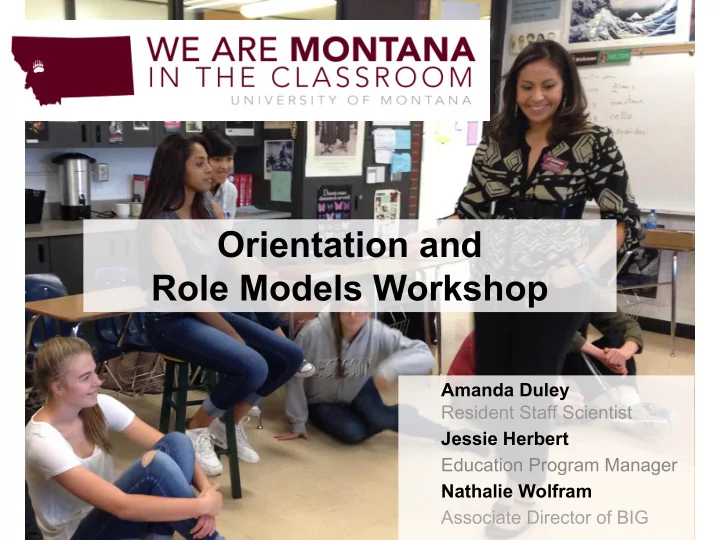

Orientation and Role Models Workshop Amanda Duley Resident Staff Scientist Jessie Herbert Education Program Manager Nathalie Wolfram Associate Director of BIG
Icebreaker time!
We Are Montana in the Classroom
We Are Montana in the Classroom • Last year: 75+ UM role models served 10,000+ K-12 students • Oct 9-13: President’s Tour • Spring 2017: Bitterroot role models • Spring 2017: STEAMfest Distance Learning • Museum visits
We Are Montana in the Classroom Types of engagement: • Tours : We Are Montana President’s Tour, School of Art Tour, UM Health & Medicine Tour & Institute on Ecosystems Tour • Distance learning : STEM Fest, Brain Awareness Week, A Celebration of Native American Scholars, Researchers & Change Makers, First Folio Festival • Day Trips : 500+ students reached regionally • Special Events : Behind-the-scenes campus tours, Montana Science Fair, Academic State Championship, spectrUM
Role Models Matter Training • 5 year project funded by NSF • Develop new print and online resources for STEM role models • Workshops for role models and role model trainers Students were asked, “What do you imagine when you think of a scientist?” Before and after a visit from a role model.
Getting past your Expert Blindspot
A Role Model Event Includes: • Icebreaker • Theme • Role model personal stories • Prop • Interactive activity ○ can be more than one activity broken up by discussion • Reflection
Icebreakers can… • Make students and role models more comfortable • Introduce new topics, vocabulary or careers • Check for background knowledge
Theme • What is the one concept about my research or career that I want students to walk away and remember? • Does this theme connect me to them? • What is the easiest way to accomplish this? • What is the best way to accomplish this?
Key Elements of a Role Model’s Personal Story • Make it personal • Use kid-friendly language • Share academic/career path • Show how you overcame obstacles These elements should be threaded throughout a role model visit! Example of a personal story. What do you think of this example?
Prop, hook time
Props or hooks • Gear or Equipment you use when you do your work • Pictures of your work space • Make sure they have a purpose that enhances your visit • Make sure they are big enough to see and not too fragile • If you hide them and show them 1 at a time, builds suspense! • If you can’t bring the real thing, bring a facsimile
Planning an Interactive Activity Material time!
Planning an Interactive Activity • Make it as hands-on and/or minds-on as possible • Engaging and Participatory • Try to give every student something to do • Make it inquiry based: solve a problem • Pick something you’re passionate about
Examples of Interactive Activities Cubesat activity
Examples of Interactive Activities Linguistics and Spanish Activity
Examples of Interactive Activities Build a brain cell
Examples of Interactive Activities Grow a salmon game
Examples of Interactive Activities
Examples of Interactive Activities • Journalism • Students interview each other regarding a topic they can relate to • Creative writing • Give a prompt, students write poetry • Business • Games that involve choice and opportunity cost • Art • Art critique, art design challenge
Planning an Interactive Activity • Resources: • https://www.scienceworld.ca/resources • SciGirls • Techbridgegirls.org • Econedlink.org • Include more than 1 activity • Have students move every 10mins
Strategies to Engage Students throughout an Interactive Activity • Use questions to promote learning • Give useful and specific feedback
The Art of Questioning • Ask open- ended questions. • Give students time after posing a question (count to 10). • Ask higher level questions to encourage higher level student thinking. What changes would you recommend to improve your design? What would happen if…? How will you test your hypothesis? What do you see as other possible outcomes? What are other real-world applications of this?
Giving Feedback • Be positive but not false. • Be specific ; don’t just say “Good job.” • Provide feedback throughout the activity. • Here are a few sentence to get you started: I really like how you… I saw you were using a lot of effort when… This is really interesting because… You were the only group that tried it this way
Connections • Connect the activity to… – Students’ lives – Your field – Other activities or disciplines These connections should be brought up throughout the hands-on activity.
Age Advice • • • • •
Ready, Set, Plan!
When you return… • • •
Thank you! To schedule time to go over your interactive activity, email White@mtcompact.org to set up an appointment with Amanda or Jessie.
Recommend
More recommend